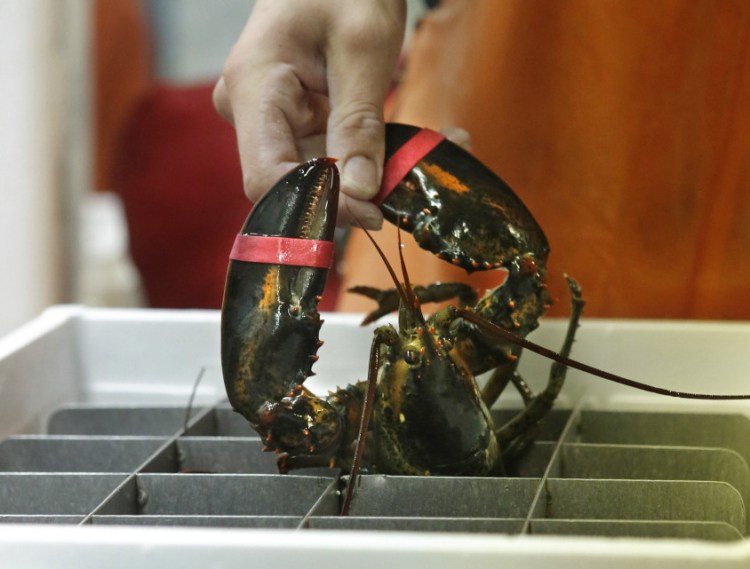The scientific arm of the European Union says there is enough evidence to move forward with a review of Sweden’s request to declare the American lobster an invasive species.
America and Canada contend Sweden’s bid to protect the European lobster from its larger American cousin, which has been found in small numbers in North Atlantic waters, lacks any scientific evidence of a pending invasion, and had hoped to squelch the proposal this summer.
But on Tuesday, the Scientific Forum on Invasive Alien Species, which is made up of experts appointed by each EU member state, confirmed the validity of Sweden’s scientific risk assessment, setting in motion a broader review that could lead to the ban of live imports into the 28-nation coalition.
An EU spokeswoman said the opinion is a first step in a long process that would not reach a conclusion until the spring, at the earliest. It will be reviewed and possibly considered for a vote by the Alien Species Committee. If approved, the motion would go to the full European Union Commission for a final vote.
“This does not prejudge in any way the decision on whether the commission will propose the lobster for listing,” said Iris Petsa. “This is a preliminary opinion on a purely scientific risk assessment and not a decision as to whether to ban the species.”
Lobstermen in the U.S. and Canada stand to lose $200 million in business with EU countries if the ban becomes a reality. In its additional review, the European Union Commission will consider the implications for international trade, as well as alternative means to protect Europe’s native lobster, Petsa said.
With the first scientific hurdle overcome, the EU will now notify the World Trade Organization, a global intergovernmental organization that enforces the rules of trade between nations, Petsa said. While Americans and Canadians had hoped thin science would head off the possibility of a ban, some in political and industrial circles are turning to an economic argument, and the WTO, for possible protection.
The Maine Lobstermen’s Association is already hinting that American politicians need to be prepared to bring this issue to the World Trade Organization if the EU adopts an invasive species label and does not consider alternatives to a ban. Last year, Maine’s lobster catch tallied nearly $500 million, with $331 million in live lobsters exported worldwide.
The National Oceanic and Atmospheric Administration had little to say in response to the forum’s opinion other than to say it remains “actively engaged” on this issue, and is preparing supplemental information for the invasive species committee’s next meeting, in early October.
The Maine congressional delegation has already appealed to various federal agencies, including the U.S. Trade Representative’s office, Secretary of State John Kerry and NOAA, to resist Sweden’s efforts.
“We continue to believe that pursuing such a prohibition is not only unsupported by science and inconsistent with the rules of the World Trade Organization, but is also an unnecessary overreaction that would have devastating economic effects on the American lobster industry that supports so many Mainers and their families,” wrote Maine’s four congressional delegates in a Tuesday afternoon joint statement. “We will continue to support Maine’s lobster industry by seeing that the science and economic impacts are made clear.”
CROSSBREEDING AND QUESTIONS
Sweden set the wheels in motion in March when it announced it had found 32 American lobsters in the country’s waters in recent years, and that they pose a threat to native crustaceans.
America exports about $150 million worth of lobster to the EU annually, and Canada sells another $75 million a year, according to export data. If a ban were approved, both countries could continue to export processed lobster to the 28 member states. Swedish officials raise this issue when dismissing claims that the invasive species label is really a protectionist trade move.
Sweden backed up its claims with an 85-page risk assessment that says the discovery of North American lobsters in the waters off Great Britain, Norway and Sweden over the past 30 years, including one female lobster carrying hybrid eggs, proved crossbreeding has taken place.
These lobsters were often banded, and found located near floating lobster pounds where imported live American lobsters are kept before being shipped to different countries within the European Union. That leads Swedish scientists to conclude that most of the American lobsters had escaped from the pounds, which are supposed to be tightly regulated, or were released by animal rights groups after being bought at the supermarket.
The Swedish scientists say a ban would protect the European lobster from crossbreeding and diseases carried by the North American lobster, and preserve the resources it depends on for survival from its more rapacious American cousin.
But Canadian and American scientists argue that Sweden’s claims are “not supported by the best available science.” The number of lobsters found in European waters over the past decade number less than 100, which is not large enough to constitute an invasion, they argue. And Sweden has not provided proof that crossbreeding lobsters produce fertile hybrid offspring, which would be necessary for the North American lobster to take over the chilly waters of the Northeast Atlantic, U.S. and Canadian scientists say.
There are crossbred lobsters held in European labs that may have reached sexual maturity, but there is no funding available to test them, leaving Swedes unsure if they could produce viable offspring.
Scientists here think most Northeast Atlantic waters are too warm, fished too hard and too full of predators, such as crabs, snapping shrimp and squat lobsters, for Homarus americanus to gain a toehold, much less overwhelm the European lobster population.
Canada and the U.S. will continue to oppose the invader classification with help from a few members and interest groups that support continued import of American lobsters, such as European restaurants, lobster dealers and lobster distributors, American fisheries officials have said.
Send questions/comments to the editors.




Comments are no longer available on this story